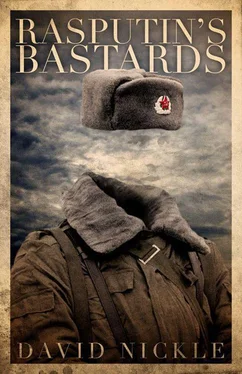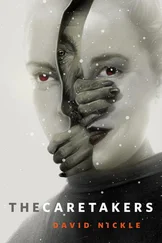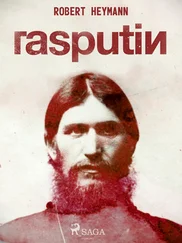“Shit.”
Alexei jumped off the bed. Kolyokov stepped back, hands still in his pockets.
“Think what you like,” he said. “It doesn’t matter. You’ll come with me in the end.”
“I will,” said Alexei. For the path with this man — this younger incarnation of Fyodor Kolyokov — was the path to the truth of his childhood. And it was, Alexei began to realize, a more terrible truth than he’d ever dared imagine.
The dream-haunted corridors of the Murmansk spy school faded and bent under the grass, and in the distance past the apartment blocks and razor-wire fences and machinegun posts, a great, dark cloud began to form. Old Fyodor Kolyokov squinted at its dissolution. It had been a good try, he thought, entering Alexei Kilodovich’s metaphor to pull him back awake.
A good try. But there was only so much he could do.
Kolyokov was beginning to understand his predicament: he wasn’t just having a very long sleep in his tank. He was, in body at any rate, deader than the proverbial doornail. Whatever lived now, whatever his thoughts inhabited, was his ghost. The world he inhabited? A metaphor, true — but not his own.
Briefly, it had been Kilodovich’s. He knew it to be so, because he had been central in constructing it. He recognized the work of his own hand — and he knew it well enough to contact young Alexei, and try and get a warning across.
But Kilodovich had had other ideas — put in him, perhaps, by the Children? Who knew. The important thing was that Kolyokov began to dismantle the metaphor too quickly — and that dismantling threw Kolyokov out. Kilodovich had moved on — to another place; a metaphor no longer of his making, perhaps closer to true memory.
There would be no communication with him here, in this ruin.
Soon, there would be no here.
Kolyokov started to walk across the ruins. The metaphor was losing its form with each step — the ground shifting between gravel and asphalt and mud depending upon how he lowered his heel. The air was neither cool nor warm. In spite of the growing cloud on the horizon, neither did that air move.
The world was coming undone with stillness.
Stillness everywhere, but in that terrible cloud. Kolyokov watched it for a moment. The cloud spread across the horizon most menacingly: black at its base, but topped by a range of purple and golden thunderheads that stretched over the curve of this world like distant mountains. Would there be tornadoes underneath that cloud? Kolyokov wondered. Lightning strikes? He heard no thunder, felt no wind, but he knew somehow that it would come. The cloud tops churned and twisted discernibly. Weather would accompany them.
But it would not. Kolyokov’s chest hitched at the realization:
I am dying .
Kolyokov had denied it for as long as he might: but when they’d pulled him from his tank and ingested him into the chaos of their Discourse — of course, they were killing him in the world of Physick. Of course, his body would not survive the ordeal.
Of course —
He was dying.
In the silence of the crumbling metaphor, Fyodor Kolyokov fell to his knees. He knew better than to pray for absolution — for entry into Heaven. Because if ever there was a God to give it, Kolyokov would not find favour with Him.
All he could hope was that the message he planted in Kontos-Wu had arrived — and Stephen had the wit to follow his advice. He hoped Mrs. Kontos-Wu had the strength to break her programming. Even if he died now, Kolyokov thought bitterly, he might still leave some legacy for his kind.
Kolyokov reached down to touch the crackling dry grass at his knees. He could feel it beneath his fingertips — but through a veil of numbness. Soon, that sensation too would be lost to him. His body — or the metaphor of his body — would crumble and blow away like this poor construct he’d made for Alexei Kilodovich all those years ago.
“Oh, Alexei.” Fyodor Kolyokov shut his eyes and wept unsalted tears. “Oh me.”
The storm cloud must have grown nearer as he wept. Because after a time, Kolyokov became aware of a breeze against his cheek, wafting through the long hairs that remained on his skull. A smell, unfiltered by numbness, excited his senses.
“Strawberries,” he said, and opened his eyes.
The storm was not only nearer — now it roiled about him, in dust devils eighteen feet tall and tiny lightning flashes from the belly of the deep ochre cloud that now made his ceiling. Kolyokov wiped the dampness from his eyes even as the rain began to fall.
“Garlic,” he said, sniffing the air like a hound tracing a scent. “And — what is that under-scent?”
Peat .
The sensation brought about by that word in Kolyokov’s skull was more novel than even the breeze and smells in this place. He had not, he realized, heard a voice speak in his skull like that since… since the Soviet. When he had controllers of his own to deal with.
Kolyokov smiled.
“Children?” He pushed himself to his feet, and stared into the wall of cloud and dust that now surrounded him in a vortex just fifty feet across. “Vladimir? Doonya? Which one of my beauties is this?”
The cloud rumbled a deep laugh.
No children here .
“Ah,” said Kolyokov, “there is no need to dissemble, my children. I am quite at your mercy. For I am nearly dead, now, is that not so?”
That , said the cloud, is the only thing that is so. Understand, Fyodor Kolyokov, that the Children you have been seeking are quite beyond your reach now .
“I see.”
There is only Me .
“Only you. I mean, forgive me — You.”
The cloud was silent, but for the lashing of its winds and the rumbles of thunder in its belly.
“So what is my predicament. Am I talking with God now?”
Only Me .
“Yes. Upper case ‘Me.’ You’re claiming to be God, am I right?”
Not — quite .
“Well, let me tell you something, not-quite God,” said Kolyokov. “I never bowed to you in my life — and I won’t now.”
A moment ago, you were weeping .
“Yes. You’re omniscient, so you can tell that poor little Kolyokov is weeping from thirty kilometres south of the metaphor. Forgive me if I’m not impressed.”
There is no reason you should be. We both know, Fyodor, that the metaphor is but our own construct — and the powers of a God can be fashioned there as readily as can a convincing bowl of soup. But I repeat: a moment ago you were weeping .
Kolyokov shifted and wiped a strand of hair that was tickling his eye. He coughed; the cloud now stank of strawberry and garlic and peat.
“A man faces his death as best he is able,” said Kolyokov.
You think you are dying?
“Did you not say as much yourself?”
Yes. For dying was how I found you. But Fyodor — you must know that dying is not dead. You may yet be saved .
Fyodor threw back his head and laughed.
“Saved? Ha! So You are God! A very Orthodox God, yes? Do You want me to confess my sins before we depart unto Heaven? I warn You, terrible cloud, it could take some time — for I have been a very wicked Kolyokov and I have not been to confession in seventy-two years! Ha!”
The cloud rumbled and quaked, and the vortex for a moment drew closer to him. Kolyokov could see a blur of rocks and branches in its substance. When it spoke again, its voice was as a thunderclap in Kolyokov’s head.
You have not changed, you bastard .
It took Kolyokov a moment to regain his senses. The intensity of the cloud’s voice was bad enough — if such a shout had entered his Physick brain, it might have caused him a stroke. But that intensity was nothing compared to the shock of recognition.
Читать дальше












